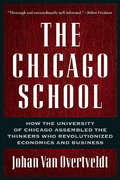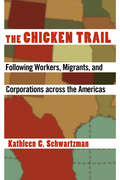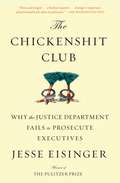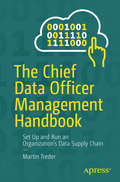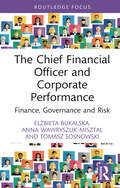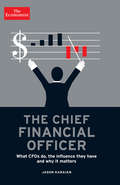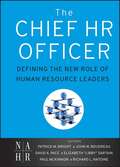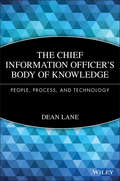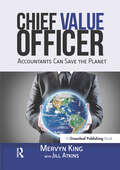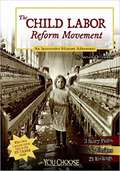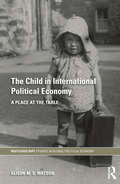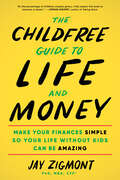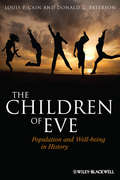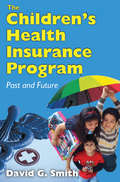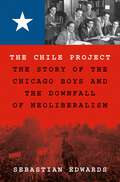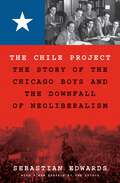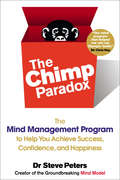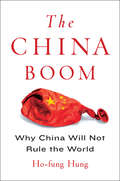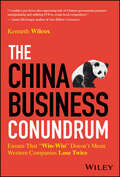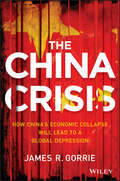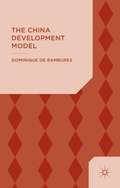- Table View
- List View
The Chicago School: How the University of Chicago Assembled the Thinkers Who Revolutionized Economics and Business
by Johan Van OvertveldtThis “admirably detailed and thoroughly welcome history” provides a fascinating examination of a pivotal moment in the evolution of economic theory (The Economist).When Richard Nixon said “We are all Keynesians now” in 1971, few could have predicted that the next three decades would result in a complete transformation of the global economic landscape. The transformation was led by a small, relatively obscure group within the University of Chicago’s business school and its departments of economics and political science. These thinkers — including Milton Friedman, Gary Becker, George Stigler, Robert Lucas, and others — revolutionized economic orthodoxy in the second half of the 20th century, dominated the Nobel Prizes awarded in economics, and changed how business is done around the world.Written by a leading European economic thinker, The Chicago School is the first in-depth look at how this remarkable group came together. Exhaustively detailed, it provides a close recounting of the decade-by-decade progress of the Chicago School’s evolution. As such, it’s an essential contribution to the intellectual history of our time.
The Chicken Trail
by Kathleen C. SchwartzmanIn The Chicken Trail, Kathleen C. Schwartzman examines the impact of globalization-and of NAFTA in particular-on the North American poultry industry, focusing on the displacement of African American workers in the southeast United States and workers in Mexico. Schwartzman documents how the transformation of U.S. poultry production in the 1980s increased its export capacity and changed the nature and consequences of labor conflict. She documents how globalization-and NAFTA in particular-forced Mexico to open its commodity and capital markets, and eliminate state support of corporations and rural smallholders. As a consequence, many Mexicans were forced to abandon their no longer sustainable small farms, with some seeking work in industrialized poultry factories north of the border. By following this chicken trail, Schwartzman breaks through the deadlocked immigration debate, highlighting the broader economic and political contexts of immigration flows. The narrative that undocumented worker take jobs that Americans don't want to do is too simplistic. Schwartzman argues instead that illegal immigration is better understood as a labor story in which the hiring of undocumented workers is part of a management response to the crises of profit making and labor-management conflict. By placing the poultry industry at the center of a constellation of competing individual, corporate, and national interests and such factors as national debt, free trade, economic development, industrial restructuring, and African American unemployment, The Chicken Trail makes a significant contribution to our understanding of the implications of globalization for labor and how the externalities of free trade and neoliberalism become the social problems of nations and the tragedies of individuals.
The Chickenshit Club: Why the Justice Department Fails to Prosecute Executives
by Jesse EisingerFrom Pulitzer Prize–winning journalist Jesse Eisinger, a blistering account of corporate greed and impunity, and the reckless, often anemic response from the Department of Justice.Why were no bankers put in prison after the financial crisis of 2008? Why do CEOs seem to commit wrongdoing with impunity? The problem goes beyond banks deemed “Too Big to Fail” to almost every large corporation in America—to pharmaceutical companies and auto manufacturers and beyond. The Chickenshit Club—an inside reference to prosecutors too scared of failure and too daunted by legal impediments to do their jobs—explains why. A character-driven narrative, the book tells the story from inside the Department of Justice. The complex and richly reported story spans the last decade and a half of prosecutorial fiascos, corporate lobbying, trial losses, and culture shifts that have stripped the government of the will and ability to prosecute top corporate executives. The book begins in the 1970s, when the government pioneered the notion that top corporate executives, not just seedy crooks, could commit heinous crimes and go to prison. The book travels to trading desks on Wall Street, to corporate boardrooms and the offices of prosecutors and F.B.I agents. These revealing looks provide context for the evolution of the Justice Department’s approach to pursuing corporate criminals through the early aughts and into the Justice Department of today. Exposing one of the most important scandals of our time, The Chickenshit Club provides a clear, detailed explanation as to how our Justice Department has come to avoid, bungle, and mismanage the fight to bring these alleged criminals to justice.
The Chief Data Officer Management Handbook: Set Up and Run an Organization’s Data Supply Chain
by Martin TrederThere is no denying that the 21st century is data driven, with many digital industries relying on careful collection and analysis of mass volumes of information. A Chief Data Officer (CDO) at a company is the leader of this process, making the position an often daunting one. The Chief Data Officer Management Handbook is here to help.With this book, author Martin Treder advises CDOs on how to be better prepared for their swath of responsibilities, how to develop a more sustainable approach, and how to avoid the typical pitfalls. Based on positive and negative experiences shared by current CDOs, The Chief Data Officer Management Handbook guides you in designing the ideal structure of a data office, implementing it, and getting the right people on board.Important topics such as the data supply chain, data strategy, and data governance are thoughtfully covered by Treder. As a CDO it is important to use your position effectively with your entire team. The Chief Data Officer Management Handbook allows all employees to take ownership in data collaboration. Data is the foundation of present and future tech innovations, and you could be the leader that makes the next big impact.What You Will LearnApply important elements of effective data managementGain a comprehensive overview of all areas of data (which are often managed independently Work with the data supply chain, from data acquisition to its usage, a review of all relevant stakeholders, data strategy, and data governanceWho This Book is ForCDOs, data executives, data advisors, and all professionals looking to understand about how a data office functions in an organization.
The Chief Financial Officer and Corporate Performance: Finance, Governance and Risk (Routledge Focus on Economics and Finance)
by Elżbieta Bukalska Anna Wawryszuk-Misztal Tomasz SosnowskiFinancial management encompasses a set of complex activities that should be performed by a professional financial manager. Some financial decisions are riskier than others, and as such can result in higher or lower profitability. This risk-return trade-off is the key aspect of financial management. Furthermore, a financial director’s propensity to take risks can lead to less or more conservative financial decisions.This study firstly provides theoretical issues on financial management and the results of previous research, while the second part is empirical, showing the methodology and results of the authors’ research. Apart from CFO risk attitude, the book also examines CFO power. The book highlights the importance of the position of financial managers in companies and demonstrates that financial decisions are the reflection of decision-makers’ characteristics. Additionally, the book provides evidence of whether the COVID-19 crisis has increased or decreased the impact of CFO characteristics on financial decision-making and firm performance.The book will attract the attention of researchers and students of corporate finance and accounting and also contains many valuable tips and insights for practitioners.
The Chief Financial Officer: What CFOs Do, the Influence they Have, and Why it Matters (Economist Books)
by The Economist Jason KaraianThe rapid rise in importance of the role of the chief financial officer--from back-office accountant to front-line executive--is unrivaled by that of any other corporate position. With access to every facet of the business, CFOs now wield a level of influence matched only by chief executives.This book explains how CFOs earned their privileged status, and what the future may hold for them. It describes their ever-expanding role, and how they are reshaping their departments to help them deal with that transformation. Insights from current and former CFOs provide a first-hand perspective on finance leaders' aspirations and doubts. It is a useful reference for finance chiefs seeking to learn from peers and benchmark their own performance; for those looking to build a career in the C-Suite; for managers seeking to improve their relationship with the finance department; for service providers-banks, accountancies and consulting firms--and anyone else who wants to get on the good side of the keeper of the corporate checkbook.
The Chief HR Officer
by Libby Sartain Patrick M. Wright Paul Mckinnon John Boudreau David Pace Richard AntoinePraise for the chief HR Officer"The strategic portfolio of issues addressed and the sage wisdom and perspectives shared make this book a powerful transformation tool." -Jodee Kozlak, executive vice president, Human Resources, Target Corporation"An up-to-the-minute guide as to what is happening to the field of human resources through the eyes of those in charge of it." -Peter Cappelli, George W. Taylor Professor of Management and director, Center for Human Resources, Wharton School"This is a definitive guide for human resources leaders who are at the frontlines of competitiveness for their organizations." -David A. Rodriguez, executive vice president and chief human resources officer, Marriott International "This book is a must-read for all HR professionals to understand the evolution of how far we've come as a function and how much more we have to contribute to the success of the enterprise." -William J. Conaty, former senior vice president, Human Resources, General Electric Corporation"This book is a treasure-trove of insights that will elevate the practice of human resource management to a whole new level in the twenty-first century." -Lee D. Dyer, professor and chair, Department of Human Resource Studies, Cornell University"As a CEO who understands how important managing human capital is to delivering business results, The Chief HR Officer is an invaluable resource." -Russ Fradin, CEO, Hewitt Associations"This is a must-read for state-of-the-art in human resource management." -Scott A. Snell, E. Thayer Bigelow Professor of Business Administration, Darden Graduate School of Business, University of Virginia"This accessible, practical guide for HR professionals clearly describes the critical values, behaviors and skills needed to fulfill the multiple roles of an HR leader- trusted business partner, talent architect and expert functional leader."-Sally Bott, group human resource director, BP
The Chief Information Officer's Body of Knowledge: People, Process, and Technology (Wiley CIO #571)
by Dean LaneDown to earth, real answers on how to manage technology—from renowned IT leaders Filled with over thirty contributions from practitioners who handle both the day-to-day and longer term challenges that Information Technology (IT) departments and their parent businesses face, this hands-on, practical IT desk reference is written in lay terms for business people and IT personnel alike. Without jargon and lofty theories, this resource will help you assist your organization in addressing project risks in a global and interconnected world. Provides guidance on how business people and IT can work together to maximize business value Insights from more than thirty leading IT experts Commonsense, rational solutions for issues such as managing outsourcing relationships and operating IT as a business Offering solutions for many of the problems CIOs face, this unique book addresses the Chief Information Officer's role in managing and running IT as a business, so the IT department may become a full strategic partner in the organization's crucial decisions.
The Chief Information Security Officer
by Barry L. Kouns Jake KounsDiscover the skills you need to be a successful CISO in today's changing worldThe role of the Chief Information Security Officer has evolved enormously in recent years in response to security threats and a challenging business environment. Instead of being primarily a master technician, today's CISO has to be a trusted advisor to senior management. The Changing Role of the Information Security OfficerThe CISO has overall responsibility for corporate security strategy, but today's CISO has to be in the business of managing information, not just securing it. The successful CISO needs to have excellent communication and presentation skills, and to demonstrate keen business acumen. The serious and ever-changing nature of today's security threats demand a strategic-minded response, and a successful CISO will always be thinking about how to gain business objectives through enabling technology while properly managing risk. This pocket guide emphasises the importance of a suitable information security management system (ISMS) and the risk management methodolgy that should be at its heart. Read this pocket guide and . . . Learn how the role of a CISO has changed. Today's CISO must be integrated into all aspects of the business and have a full understanding of its strategy and objectives. Understand the importance of a risk management methodology. A good risk management methodology must take into account the special information security needs of the company as well as legal and regulatory requirements. Learn how to establish a successful ISMS. The guide explains how to design and implement an ISMS that is appropriate for the organisation. It also describes the key management system processes that should be included in an ISMS. Chief Information Security Officers are bombarded with huge challenges every day, from recommending security applications to strategic thinking and business innovation. This guide describes the hard and soft skills that a successful CISO requires: not just a good knowledge of information security, but also attributes such as flexibility and communication skills.
The Chief Value Officer: Accountants Can Save the Planet
by Jill Atkins Mervyn KingIntegrated Reporting is having a profound impact on corporate thinking and reporting. Value is being assessed on the basis of the sources of value creation used by an organisation and not through a financial lens alone. In Chief Value Officer: Accountants Can Save the Planet, Mervyn King, a global corporate governance and reporting leader, challenges some of the systemic issues preventing organisations from managing in an integrated value-creation way.The shareholder-centric governance model, currently favoured by most companies, will not result in changes to corporate behaviour that can create value in a sustainable manner. The book, therefore, firmly places the accountant in the position of changemaker – the finance professional today should be more of a value officer than a financial officer. Consequently, the Chief Finance Officer should be known as the Chief Value Officer.This book explains this new approach. It encapsulates the essential reasons for adopting integrated reporting, explains its application to date and proposes the next steps needed to achieve change that will improve business, social and environmental sustainability.
The Child Labor Reform Movement: An Interactive History Adventure (You Choose: History)
by Steven Otfinoski Timothy J. GriffinIt’s the 1800s, and you are a child from a poor family. You have to go to work to keep from starving. Will you: Work as a pauper apprentice in an English factory? Emigrate from Ireland in order to work in the New England cloth mills? Make your living on the streets of New York City selling newspapers? Everything in this book happened to real people. And YOU CHOOSE what you do next. The choices you make could lead you to opportunity, to wealth, to poverty, or even to death.
The Child in International Political Economy: A Place at the Table (RIPE Series in Global Political Economy)
by Alison M.S. WatsonThis pioneering volume argues for the inclusion of children, and the structure known as 'childhood', as a permanent social category worthy of continued study within the discipline of international political economy (IPE). Fundamentally, and very simply, IPE is concerned with the dynamics of interaction across the economic and political domains; the relationship between the domestic and the international levels of analysis, and the role of the state. This book presents a convincing argument for the discussion of children within each of these areas. This volume: * provides the first book length examination of the child within IPE * draws on work from a variety of disciplines * brings rich analyses to debates about the role of the child in society Contributing insights that may be fundamental to the development of IPE as a discipline, The Child in International Political Economy will be vital reading to students and scholars of IPE, Childhood Studies, and International Relations.
The Childfree Guide to Life and Money: Make Your Finances Simple So Your Life Without Kids Can Be Amazing
by Jay Zigmont PhD, MBA, CFP®An essential and comprehensive personal finance and money management guide for Childfree and Permanently Childless people.Design the life you want, then create the right financial plan to get you there.Financial planning looks vastly different for DINKs (dual-income, no kids) and SINKs (single-income, no kids). But nearly all the advice out there assumes you have children or will have them someday. Everything from pursuing the kind of career you want; deciding whether you want to buy a house, rent, or hit the road as a digital nomad; to planning and filing taxes; budgeting and investing your money; and getting set up for retirement or your later years is different. Simply said: When you aren't following the Standard LifeScript (go to college, get married, buy a house, have kids), you have the time, money, and freedom to do what you want.Childfree Wealth Specialist® Dr. Jay Zigmont flips FIRE—Financial Independence, Retire Early—on its head, showing how people without kids can live the FILE life—Financial Independence, LIVE Early—by following his eight No-Baby Steps. Whether you're single, coupled up, or planning the perfect Golden Girls living arrangement with your best friends, The Childfree Guide to Life and Money is the most comprehensive resource for designing your life, figuring out your finances, and living your best life.
The Children of Eve: Population and Well-being in History
by Louis P. Cain Donald G. PatersonThe Children of Eve is the first book to bring together general material about population and well-being in a single volume. It presents a world history of demographic and economic change that ranges broadly over time and space and which emphasizes the commonality of human experience. The first book to put together material about population and well-being in a single volume Emphasizes the formative population history of Europe and North America over the years since the Middle Ages, and includes discussions of Asia and the southern hemisphere The authors successfully maintain the difficult balance of addressing complex issues in a style that doesn't over-simplify the subject, whilst upholding an approach that is accessible to general readers and students Designed to work as both a stand alone text or a supplement to textbooks in any number of courses
The Children's Health Insurance Program: Past and Future
by David G. SmithThe Children's Health Insurance Program was crafted in a period of intense partisan and ideological controversy over health care entitlements to provide -creditable coverage- for American children below 200 percent of the Federal Poverty Level. This objective was widely supported, though achieved only by a compromise between the structural alternatives of a block grant, similar to the Maternal and Child Health Block Grant or an entitlement resembling Medicaid. According to David G. Smith, the CHIP compromise has been a successful experiment that far exceeded expectations, both in identifying and enrolling -targeted low-income children- and in earning political capital. He argues that beyond this core mission, the reauthorization of CHIPRA (Children's Health Insurance Program Reauthorization Act of 2009) invites a larger mission: going beyond enrollment of children to include assuring access, improving quality, and containing costs of health care for them. Extending this thrust, the author notes that CHIP could be used to establish children's health as a niche--much like care for the elderly--within the larger scheme of health care insurance for all. Several areas of successful performance needed for the program to be adjudged a success as well as its limitations are discussed in the book. These areas include initial implementation, enrolling kids, federal-state relations, and the uses and misuses of waivers to modify the program. A description of changes made by the CHIPRA reauthorization and the new Patient Protection Affordable Care Act (PPACA) is also included. This is followed by a consideration of lessons learned from CHIP's evolution and recommendations for future development. In short, this is a valuable and readable account for those interested in the current and future trends of health care for the young.
The Children's Hospital of Philadelphia: Network Strategy 2016
by Michael E. Porter Thomas W Feeley Toyin J. OkanlawonIn 2009 Children's Hospital of Philadelphia (CHOP) had been recognized as the best children's hospital in the country for six years in a row; but leadership saw CHOP as more than the large main campus in western Philadelphia. Beginning in the 1990s, CHOP had created a large network of Primary Care Providers, Specialty Care Centers, Ambulatory Surgery Centers, and community hospital affiliations. CHOP leadership wanted to ensure that the quality they had demonstrated at CHOP would translate out to these facilities, and more, that the combination of many parts could actually work together to provide even better care than the main hospital could do on its own.
The Children's Hospital of Philadelphia: Network Strategy 2016
by Michael E. Porter Thomas W Feeley Toyin J. OkanlawonIn 2009 Children's Hospital of Philadelphia (CHOP) had been recognized as the best children's hospital in the country for six years in a row; but leadership saw CHOP as more than the large main campus in western Philadelphia. Beginning in the 1990s, CHOP had created a large network of Primary Care Providers, Specialty Care Centers, Ambulatory Surgery Centers, and community hospital affiliations. CHOP leadership wanted to ensure that the quality they had demonstrated at CHOP would translate out to these facilities, and more, that the combination of many parts could actually work together to provide even better care than the main hospital could do on its own.
The Chile Project: The Story of the Chicago Boys and the Downfall of Neoliberalism
by Sebastian EdwardsHow Chile became home to the world’s most radical free-market experiment—and what its downfall suggests about the fate of neoliberalism around the globeIn The Chile Project, Sebastian Edwards tells the remarkable story of how the neoliberal economic model—installed in Chile during the Pinochet dictatorship and deepened during three decades of left-of-center governments—came to an end in 2021, when Gabriel Boric, a young former student activist, was elected president, vowing that “If Chile was the cradle of neoliberalism, it will also be its grave.” More than a story about one Latin American country, The Chile Project is a behind-the-scenes history of the spread and consequences of the free-market thinking that dominated economic policymaking around the world in the second half of the twentieth century—but is now on the retreat.In 1955, the U.S. State Department launched the “Chile Project” to train Chilean economists at the University of Chicago, home of the libertarian Milton Friedman. After General Augusto Pinochet overthrew socialist president Salvador Allende in 1973, Chile’s “Chicago Boys” implemented the purest neoliberal model in the world for the next seventeen years, undertaking a sweeping package of privatization and deregulation, creating a modern capitalist economy, and sparking talk of a “Chilean miracle.” But under the veneer of success, a profound dissatisfaction with the vast inequalities caused by neoliberalism was growing. In 2019, protests erupted throughout the country, and in 2022 Boric began his presidency with a clear mandate: to end neoliberalismo.In telling the fascinating story of the Chicago Boys and Chile’s free-market revolution, The Chile Project provides an important new perspective on the history of neoliberalism and its global decline today.
The Chile Project: The Story of the Chicago Boys and the Downfall of Neoliberalism
by Sebastian EdwardsHow Chile became home to the world’s most radical free-market experiment—and what its downfall suggests about the fate of neoliberalism around the globeIn The Chile Project, Sebastian Edwards tells the remarkable story of how the neoliberal economic model—installed in Chile during the Pinochet dictatorship and deepened during three decades of left-of-center governments—came to an end in 2021, when Gabriel Boric, a young former student activist, was elected president, vowing that “If Chile was the cradle of neoliberalism, it will also be its grave.” More than a story about one Latin American country, The Chile Project is a behind-the-scenes history of the spread and consequences of the free-market thinking that dominated economic policymaking around the world in the second half of the twentieth century—but is now on the retreat.In 1955, the U.S. State Department launched the “Chile Project” to train Chilean economists at the University of Chicago, home of the libertarian Milton Friedman. After General Augusto Pinochet overthrew socialist president Salvador Allende in 1973, Chile’s “Chicago Boys” implemented the purest neoliberal model in the world for the next seventeen years, undertaking a sweeping package of privatization and deregulation, creating a modern capitalist economy, and sparking talk of a “Chilean miracle.” But under the veneer of success, a profound dissatisfaction with the vast inequalities caused by neoliberalism was growing. In 2019, protests erupted throughout the country, and in 2022 Boric began his presidency with a clear mandate: to end neoliberalismo.In telling the fascinating story of the Chicago Boys and Chile’s free-market revolution, The Chile Project provides an important new perspective on the history of neoliberalism and its global decline today.
The Chimp Paradox: The Mind Management Program to Help You Achieve Success, Confidence, and Happine ss
by Steve PetersYour inner Chimp can be your best friend or your worst enemy...this is the Chimp Paradox Do you sabotage your own happiness and success? Are you struggling to make sense of yourself? Do your emotions sometimes dictate your life? Dr. Steve Peters explains that we all have a being within our minds that can wreak havoc on every aspect of our lives--be it business or personal. He calls this being "the chimp," and it can work either for you or against you. The challenge comes when we try to tame the chimp, and persuade it to do our bidding. The Chimp Paradox contains an incredibly powerful mind management model that can help you be happier and healthier, increase your confidence, and become a more successful person. This book will help you to: --Recognize how your mind is working --Understand and manage your emotions and thoughts --Manage yourself and become the person you would like to be Dr. Peters explains the struggle that takes place within your mind and then shows you how to apply this understanding. Once you're armed with this new knowledge, you will be able to utilize your chimp for good, rather than letting your chimp run rampant with its own agenda.
The China Boom: Why China Will Not Rule the World (Contemporary Asia in the World)
by Ho-Fung HungMany thought China's rise would fundamentally remake the global order. Yet, much like other developing nations, the Chinese state now finds itself in a status quo characterized by free trade and American domination. Through a cutting-edge historical, sociological, and political analysis, Ho-fung Hung details the competing interests and economic realities that temper the dream of Chinese supremacy—forces that are stymieing growth throughout the global South.Hung focuses on four common misconceptions: that China could undermine orthodoxy by offering an alternative model of growth; that China is radically altering power relations between the East and the West; that China is capable of diminishing the global power of the United States; and that the Chinese economy would restore the world's wealth after the 2008 financial crisis. His work reveals how much China depends on the existing order and how the interests of the Chinese elites maintain these ties. Through its perpetuation of the dollar standard and its addiction to U.S. Treasury bonds, China remains bound to the terms of its own prosperity, and its economic practices of exploiting debt bubbles are destined to fail. Hung ultimately warns of a postmiracle China that will grow increasingly assertive in attitude while remaining constrained in capability.
The China Business Conundrum: Ensure That "Win-Win" Doesn't Mean Western Companies Lose Twice
by Ken WilcoxRevealing account of the struggles and surprises when forming a financial joint venture with China The China Business Conundrum: Ensure That "Win-Win" Doesn't Mean Western Companies Lose Twice describes former CEO of Silicon Valley Bank (SVB) Ken Wilcox's firsthand challenges he encountered in four years “on the ground” trying to establish a joint venture between SVB and the Chinese government to fund local innovation design—and the Chinese Communist Party (CCP) efforts to systematically sabotage the project and steal SVB's business model. This book provides actionable advice drawn from meticulous notes Wilcox took from interviews with people from all walks of Chinese life, including Party and non-Party members, the business elite, and domestic workers. Describing a China he found fascinating and maddeningly complex, this book explores topics including: Difficulties in transplanting SVB's model to China, from misunderstandings about titles and responsibilities to pitched battles over toilet design Ethics and practices widely adopted by Chinese businesses today and why China must be met with realistic expectations Wilcox's own honest missteps and the painfully learned lessons that came afterwards Engrossing, enlightening, and entertaining, The China Business Conundrum: Ensure That "Win-Win" Doesn't Mean Western Companies Lose Twice is an essential cautionary tale and guidebook for all Western bankers, C-suite executives, consultants, and entrepreneurs seeking to do business within China.
The China Crisis
by James R. GorrieA controversial look at the impending Chinese economic collapse--the history behind it, its contemporary causes, and its dire implications for the global economyAll the experts agree: the 21st century belongs to China. Given America's looming insolvency and the possibility of the collapse of the U.S. dollar, who can doubt that China is poised to take over the role of economic superpower? Written by political economist and leading financial journalist James Gorrie, this book offers a highly controversial, contrarian view of contemporary China. Drawing upon a wealth of historical and up-to-the-minute data, Gorrie makes a strong case that China, itself, is on the verge of an economic crisis of epic proportions. He explains how, caught in a recurrent boom/bust cycle that has played itself out several times over the past sixty years, China is again approaching total economic and social collapse. But with one important difference this time: they may very well take the entire global economy down with them.Explores the Chinese communist party's unfortunate history of making costly and very bloody mistakes on an enormous scaleOne-by-one Gorrie analyzes those critical mistakes and explains how they may lead to economic collapse in China and global depressionDescribes Chinese "cannibal capitalism," and where its massive abuse of the country's environment, people, and arable lands is leading that country and the world economyChronicles China's history of recurring economic crisis and explains why all the evidence suggests that history is about to repeat itself
The China Dairy Farming Institute: New Frontiers in Innovative Collaborations
by Ray A. Goldberg Meredith NilesCase
The China Development Model
by Dominique De RamburesOver the last thirty years, China has been reforming its economy at breakneck speed. However a surge in nationalism is threatening China's relations with its neighbours and its rise to regional leadership. This book addresses a wide range of factors influencing the development of China's model and its influence on the rest of the world.
